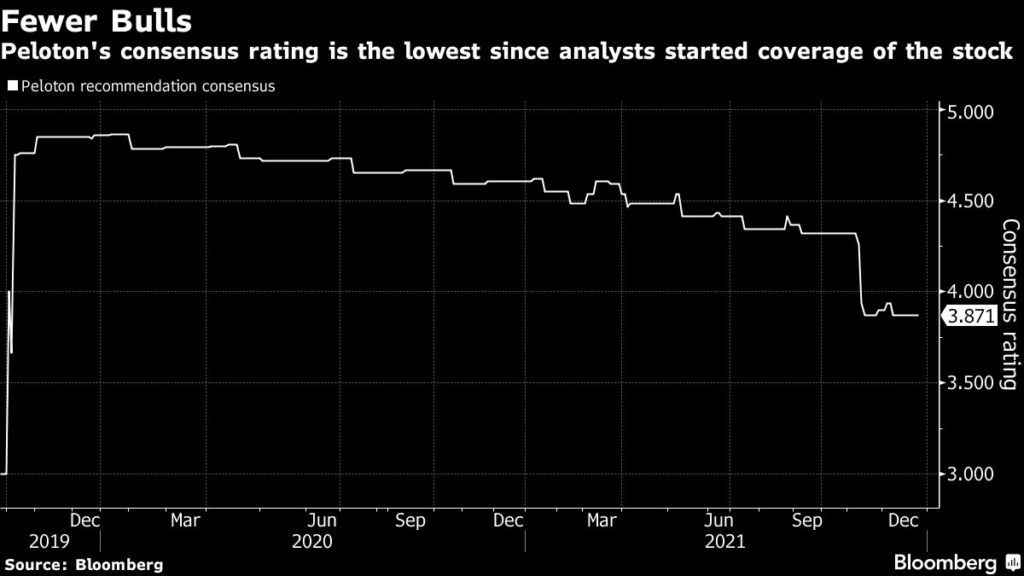(Bloomberg) — Peloton Interactive Inc. was a Wall Street darling a year ago, with analysts almost universally recommending buying the home-fitness company’s shares after they had soared 434% in 2020.
BMO Capital Markets’ Simeon Siegel was the first bear to predict the stock’s subsequent crash, and he says the pain isn’t over.
“From the beginning, our concern was that Covid was going to prove a pull forward of demand rather than an expansion of it,” he said by phone. “That’s what we’re seeing right now — the faltering of demand. The problem was when 80% of the company’s business is driven by equipment sales and equipment sales are generally a one time thing.”
He warned investors about this last year, expecting that revenues would likely see pressure after that quarterly holiday season. At that time, Siegel had a share price target of $33 and the first sell-equivalent rating on the stock.
Since then, Siegel — who is also a Peloton user — has maintained his underperform rating but raised his price target to $45. In a Dec. 9 report, he questioned whether Peloton was losing control over its brand image when the company was forced to do some damage control after an iconic television character in the new “Sex and the City” show, “And Just Like That…”, died after using a Peloton bike.
“To all of their credit, Peloton’s marketing team is one of the best in the industry,” Siegel said. “And they did a fantastic job in telling that story and having people feel a part of something bigger. The problem was the story became louder than the numbers.”
Analyst recommendations have become less bullish as the company’s woes have mounted. Peloton’s ratio of buy ratings, holds and sells is at the lowest level since analysts started coverage after its 2019 debut. Sales have slowed as the world returns to a semblance of normalcy, and everything from product recalls to the unfavorable cameo in the “Sex and the City” reboot has hit its reputation.
The stock currently has 16 buys, 13 holds and two sells among analysts tracked by Bloomberg. At the start of the year roughly 90% of analysts recommended buying Peloton shares, even as they struggled to extend their meteoric rally from 2020.
The majority of analyst downgrades this year were prompted by Peloton’s disappointing quarterly results in November, when management slashed its annual sales forecast by as much as $1 billion.
At least five analysts lowered their ratings following the guidance cut, which came just 10 weeks after the company first provided a fiscal-year outlook.
“It raises the bigger question around whether the company has a clear ability to forecast their revenues and profits,” said Rohit Kulkarni of MKM Partners, who reduced his rating from buy to neutral.
A Peloton spokesperson declined to comment on the stock price or analyst reports.
Softening Demand
During the November earnings call, management said the company is taking “significant corrective actions” to improve its profitability outlook, which will impact the back half of fiscal 2022 and part of fiscal 2023.
Peloton shares have dropped in six of the seven weeks since the company’s quarterly update. The stock is down about 76% in 2021, making it the worst performer in the Nasdaq 100 Index, which is up 28% this year. Peloton closed at the lowest level since May 2020 on Wednesday.
Kulkarni expects the shares to remain under pressure until Peloton shows it can meet expectations and deliver a few consistent quarters. And the company may be several quarters away from that.
Google Search Trends data, which has been historically correlated with Peloton hardware sales, suggests demand has continued to soften in the December quarter, Raymond James analyst Aaron Kessler wrote in a research note earlier this week.
“Significant demand was pulled forward during the pandemic and as such sales are not seeing the typical seasonality that we would expect,” Kessler wrote. He anticipates guidance for the December quarter and fiscal 2022 will prove “aggressive.”
Bulls Remain
That said, plenty of Peloton bulls remain on Wall Street. The average analyst 12-month price target is $74, which is more than twice the stock’s trading level of around $35 but still a far cry from the all-time high of $167.42 reached in January.
Edward Yruma of KeyBanc Capital Markets is maintaining his overweight rating, citing the ongoing shift to digital at-home fitness routines and Peloton’s position as the industry leader.
“2020 really accelerated that secular change,” Yruma said. “2021 was a leveling off period, but we think that that trend will continue over the longer term.”
For BMO’s Siegel, it will come down to demand.
“We’ve seen a company that was propelled to the big stage probably earlier than they should have been. Because if not for the pandemic, they would have just continued pushing along, growing at a very aggressive clip. But I think that they mistook the heightened demand during the pandemic for sustainable demand.”
More stories like this are available on bloomberg.com
©2022 Bloomberg L.P.











